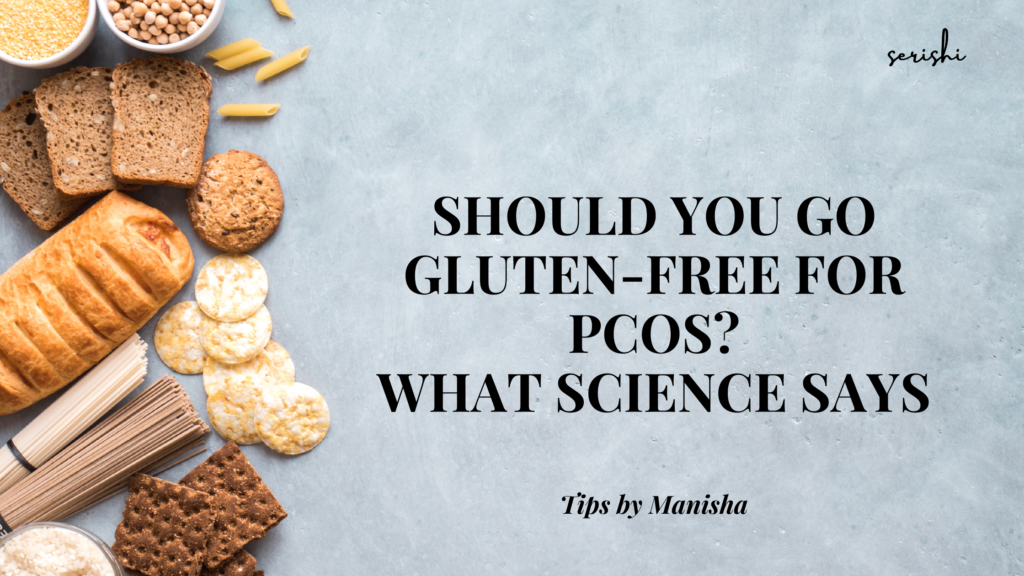Introduction
Polycystic Ovary Syndrome (PCOS) is a common hormonal disorder that affects millions of women worldwide. It is linked to insulin resistance, inflammation, and hormonal imbalance, making dietary choices an essential part of managing symptoms effectively.
One of the biggest debates in the PCOS community is whether a gluten-free diet can help improve symptoms. Many women with PCOS wonder:
✔ Does gluten increase inflammation in PCOS?
✔ Can a gluten-free diet help with weight loss?
✔ What are the best gluten-free alternatives for PCOS?
In this article, we’ll explore the science behind gluten and PCOS, discuss the pros and cons of a gluten-free diet, and provide a practical guide on how to make the right dietary choices for hormone balance.
Let’s dive in!
What is Gluten?
Gluten is a protein found in wheat, barley, and rye. It gives dough its elasticity and is commonly found in foods like:
🔹 Bread
🔹 Pasta
🔹 Cereals
🔹 Baked goods
🔹 Processed foods
While gluten itself is not harmful to most people, some individuals may experience negative reactions to it, especially those with gluten sensitivity, celiac disease, or autoimmune disorders.
The Connection Between Gluten and PCOS
Many women with PCOS struggle with chronic inflammation and insulin resistance. Some research suggests that gluten may:
🚨 Trigger inflammation – Gluten can increase markers of inflammation, which can worsen hormonal imbalances in PCOS.
🚨 Affect gut health – Poor gut health is common in women with PCOS, and gluten may contribute to leaky gut syndrome.
🚨 Raise blood sugar levels – Many gluten-containing foods, like bread and pasta, are high in refined carbs, which can spike insulin levels and worsen PCOS symptoms.
Serishi Tip: A diet focused on whole, anti-inflammatory foods may help improve PCOS symptoms, whether you eliminate gluten or not.
Should You Avoid Gluten with PCOS?
The short answer: It depends.
Some women with PCOS benefit from going gluten-free, while others may not notice a difference. Let’s look at the pros and cons.
✅ Potential Benefits of a Gluten-Free Diet for PCOS
✔ Reduces Inflammation – If you are sensitive to gluten, eliminating it may help reduce bloating, digestive issues, and joint pain.
✔ Supports Weight Loss – Many gluten-free diets focus on whole, unprocessed foods, which can reduce calorie intake and promote weight loss.
✔ Improves Insulin Sensitivity – Cutting out refined carbs (found in bread and pasta) can help stabilize blood sugar levels.
✔ Better Gut Health – A gluten-free diet may improve digestion and reduce gut inflammation.
❌ Potential Drawbacks of Going Gluten-Free
🚫 Nutrient Deficiencies – Many gluten-free products are low in fiber, iron, and B vitamins.
🚫 Not All Gluten-Free Foods Are Healthy – Processed gluten-free foods can still be high in sugar and unhealthy fats.
🚫 Unnecessary Restriction – If you are not sensitive to gluten, eliminating it may not provide significant benefits.
Signs You Might Benefit from a Gluten-Free Diet
You might consider going gluten-free if you experience:
⚡ Chronic bloating, gas, or stomach pain after eating gluten
⚡ Brain fog, fatigue, or mood swings
⚡ Persistent inflammation or joint pain
⚡ Unexplained skin issues, such as acne or eczema
If you suspect gluten sensitivity, try an elimination diet: Remove gluten for 4-6 weeks and track changes in your symptoms.
Best Gluten-Free Foods for PCOS
If you decide to go gluten-free, focus on nutrient-dense, whole foods. Here’s a list of PCOS-friendly gluten-free options:
🥑 Healthy Carbs: Quinoa, brown rice, millet, sweet potatoes
🥜 Proteins: Lentils, chickpeas, eggs, tofu, nuts
🥦 Vegetables: Spinach, broccoli, bell peppers, zucchini
🍓 Fruits: Berries, apples, oranges, avocados
🌿 Healthy Fats: Olive oil, flaxseeds, chia seeds, almonds
Gluten-Free Meal Plan for PCOS
| Meal | Gluten-Free Option | PCOS Benefits |
|---|---|---|
| Breakfast | Oatmeal with flaxseeds & berries | Supports hormonal balance |
| Lunch | Grilled chicken with quinoa & spinach | Helps reduce inflammation |
| Snack | Greek yogurt with walnuts & cinnamon | Improves insulin sensitivity |
| Dinner | Stir-fried tofu with cauliflower rice | Supports gut health |
Gluten-Free Diet: FAQs
1. Can going gluten-free cure PCOS?
No, PCOS has no cure, but a well-balanced diet can help manage symptoms effectively.
2. How long should I try a gluten-free diet?
Give it at least 4-6 weeks and track your symptoms. If you feel better, it may be worth continuing.
3. What are the best gluten-free grains for PCOS?
✔ Quinoa – High in fiber and protein
✔ Millet – Supports digestion and gut health
✔ Brown rice – Helps stabilize blood sugar levels
4. Do I need to avoid gluten if I don’t have a sensitivity?
Not necessarily! If you feel fine eating whole wheat and barley, focus on portion control and whole grains instead of going completely gluten-free.
Final Thoughts & Quote from Manisha Choudhary
Going gluten-free for PCOS is not a one-size-fits-all approach. While some women may see improvements in inflammation, weight loss, and digestion, others may not notice a difference.
The key takeaway is to focus on a nutrient-dense, whole-foods diet while avoiding highly processed and refined foods—whether they contain gluten or not.
Quote from Manisha Choudhary:
“The goal isn’t just to remove gluten—it’s to build a balanced, anti-inflammatory diet that nourishes your body and supports hormone health. Focus on whole, real foods that fuel your well-being.”
About the Author
Manisha Choudhary
Sr. Dietitian cum Nutritionist
Founder, CEO – Serishi
Manisha Choudhary is a seasoned Sr. dietitian and nutritionist passionate about helping individuals achieve healthier lifestyles through balanced nutrition. With over 10 years in the field, Manisha specializes in weight management, chronic disease management, postpartum recovery, and wellness nutrition. Her approach emphasizes sustainable, science-backed diet plans that cater to individual needs without compromising on taste or satisfaction. Manisha is dedicated to empowering her clients with the tools they need to make informed dietary choices, transforming their health and well-being one step at a time.

